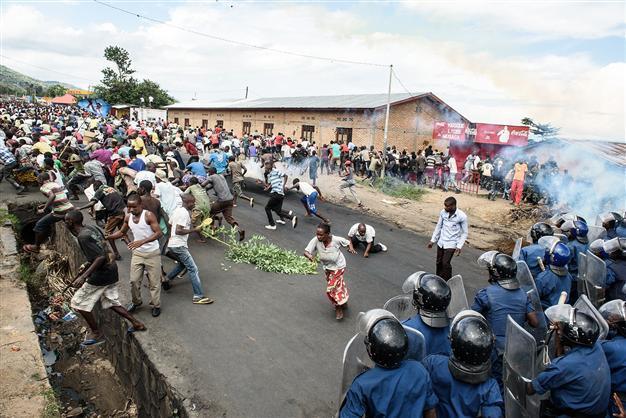Clashes erupt after Burundi coup attempt
BUJUMBURA, Burundi - Agence France-Presse

AFP Photo
Heavy fighting between rival Burundian troops erupted in the capital on May 14, the day after a top general launched a coup to oust the central African nation's President Pierre Nkurunziza.Military sources and witnesses said troops loyal to the president, who was outside the country when the coup was launched and who has been blocked from returning, were fighting off an attack against the state television and radio complex.
AFP reporters said the crackle of automatic weapons fire and the thump of explosions could be heard throughout the night and intensifying before dawn.
The streets were largely deserted by civilians as sporadic clashes could be heard in other parts of the city, while plumes of smoke were seen on the city skyline.
According to a pro-coup military source, the state media complex was attacked in the early hours of the morning after Burundi's armed forces chief used national radio to declare that the coup, launched by former intelligence chief Godefroid Niyombare, had failed.
"The national defence force calls on the mutineers to give themselves up," armed forces chief General Prime Niyongabo, a supporter of the president, said in an address on state radio.
However a spokesman for the anti-Nkurunziza camp, Burundi's police commissioner Venon Ndabaneze, told AFP the claim was false and that General Niyombare's supporters were in control of many facilities including Bujumbura's international airport.
A journalist inside the RTNB building said the complex came under attack after the loyalist broadcast, and that heavy weapons including cannons and rockets were being used.
The attempted coup capped weeks of deadly civil unrest sparked by the president's controversial bid to stand for a third term.
The crisis has raised fears of a return to widespread violence in the impoverished country, which is still recovering from a 13-year civil war that ended in 2006 and which left hundreds of thousands dead.
Opposition and rights groups insist that it is unconstitutional for Nkurunziza, who has been in office since 2005, to run for more than two terms. The president, however, argues his first term did not count as he was elected by parliament, not directly by the people.
Nkurunziza, a former rebel leader from the Hutu majority and born-again Christian, also believes he ascended to the presidency with divine backing.
More than 22 people have been killed and scores wounded since late April, when Burundi's ruling CNDD-FDD party -- which has been accused of intimidating the opposition and arming its own militia -- nominated Nkurunziza to stand for re-election in June 26 polls.
More than 50,000 Burundians have fled the violence to neighbouring nations in recent weeks, with the UN preparing for thousands more refugees.
There was uncertainty over the whereabouts Nkurunziza, whose attempt to return home from Tanzania after the coup was announced was blocked by his opponents who seized the airport and ordered the borders to be shut.
An AFP correspondent confirmed the airport in the Burundian capital had been shut and appeared to be in the hands of pro-coup forces.
Reports suggested Nkurunziza had returned to Tanzania after his plane had been forced to turn back.
The attempted coup has sparked international alarm, with Washington urging Burundians to "lay down arms, end the violence and show restraint".
Those calls were echoed by the European Union which warned it was "essential the situation does not spin out of control".
UN Secretary General Ban Ki-moon also made an urgent appeal for calm, while the Security Council said it would hold an emergency meeting on the situation on May 14.
In his message announcing the coup, Niyombare signalled he did not want to take power himself, vowing to form a "committee for the restoration of national harmony" and work for "the resumption of the electoral process in a peaceful and fair environment."
Niyombare is a highly respected figure who was sacked from his intelligence post in February after he opposed Nkurunziza's attempt to prolong his 10-year rule.
Asked to rule on the issue of a third term, Burundi's constitutional court found in the president's favour but not before one of the judges fled the country, claiming its members were subject to death threats.
















